Can a Dirty Cage Make a Hamster Sick? The Importance of Keeping Your Hamster’s Cage Clean
A hamster is an adorable and low-maintenance pet that’s perfect for those who live in small spaces. However, with this type of pet, it’s crucial to maintain a clean and healthy habitat. One of the most common questions that hamster owners ask is whether a dirty cage can make their pet sick.
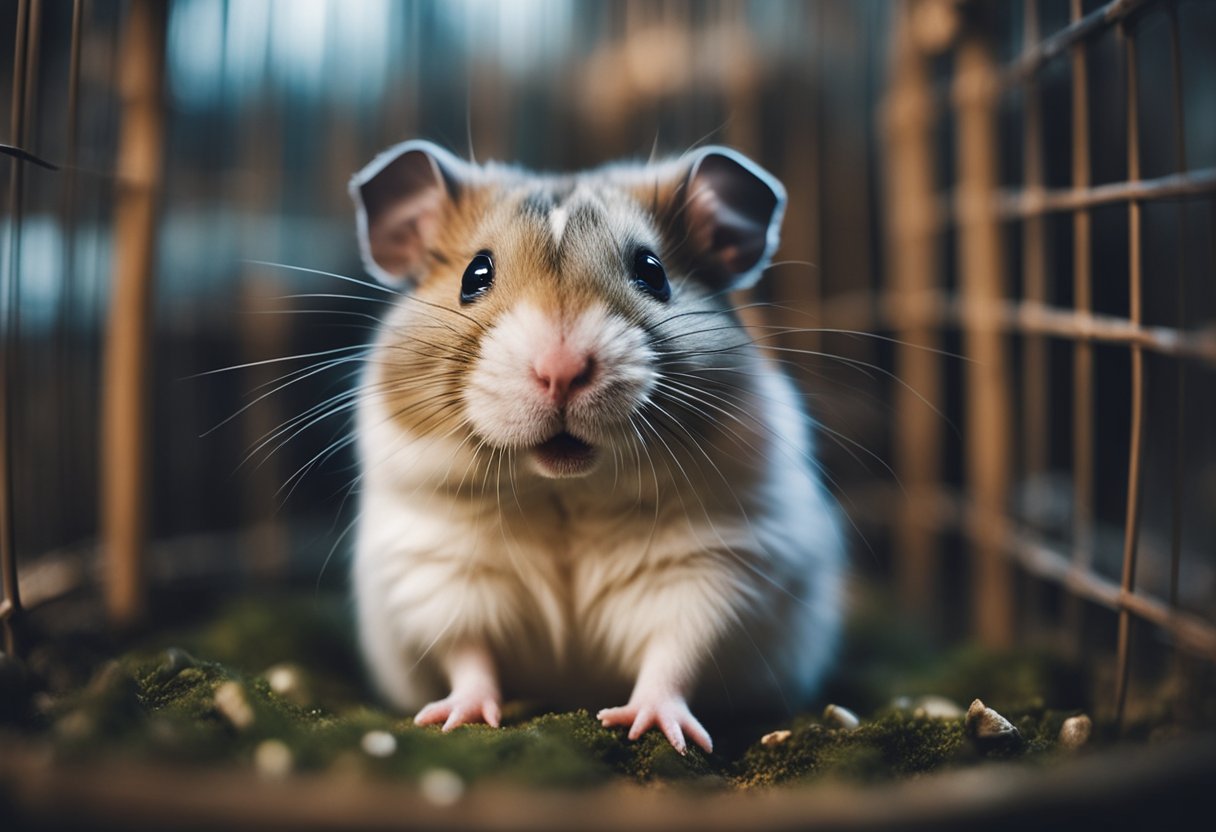
The answer is yes, a dirty cage can make a hamster sick. Hamsters are sensitive to the environment they live in, and a dirty cage can lead to respiratory problems, skin irritations, stress, and even death. When a hamster’s cage is not cleaned regularly, it can harbor dust, mold, and bacteria that can cause respiratory infections. Hamsters with respiratory infections may exhibit symptoms such as sneezing, wheezing, difficulty breathing, and nasal discharge. These infections can become severe if not treated promptly by a veterinarian.
To ensure that your hamster stays healthy, it’s crucial to maintain a clean and healthy habitat. This article will discuss the impact of cage cleanliness on hamster health, best practices for maintaining a clean hamster habitat, and frequently asked questions about hamster care. By following these guidelines, you can ensure that your hamster stays happy and healthy.
Key Takeaways
- A dirty cage can make a hamster sick, leading to respiratory problems, skin irritations, stress, and even death.
- To maintain a clean and healthy habitat for your hamster, it’s crucial to clean the cage regularly, spot clean daily, and use safe cleaning products.
- By following best practices for maintaining a clean hamster habitat, you can ensure that your pet stays happy and healthy.
Impact of Cage Cleanliness on Hamster Health

Keeping your hamster’s cage clean is an essential part of ensuring its health and happiness. A dirty cage can have negative impacts on your hamster’s physical and mental health. In this section, we will explore the effects of a dirty cage on your hamster’s health.
Infections and Diseases
A dirty cage can lead to a buildup of bacteria and other harmful substances that can cause respiratory problems, skin irritations, and even infections in your hamster. Respiratory infections are common in hamsters and can be caused by a dirty cage. Hamsters are also susceptible to skin infections, which can be caused by dirty bedding or a dirty cage. Regular cleaning of your hamster’s cage can help prevent these infections and diseases.
Stress and Behavioral Issues
A dirty cage can also lead to stress and behavioral issues in your hamster. Hamsters are naturally clean animals, and a dirty environment can cause stress and anxiety. This can lead to behavioral issues, such as aggression or depression. A clean and tidy environment can promote mental well-being in your hamster and prevent stress and behavioral issues.
In conclusion, keeping your hamster’s cage clean is essential for its health and happiness. A dirty cage can lead to infections, diseases, stress, and behavioral issues. Regular cleaning of your hamster’s cage can help prevent these issues and ensure your hamster lives a happy and healthy life.
Best Practices for Maintaining a Clean Hamster Habitat
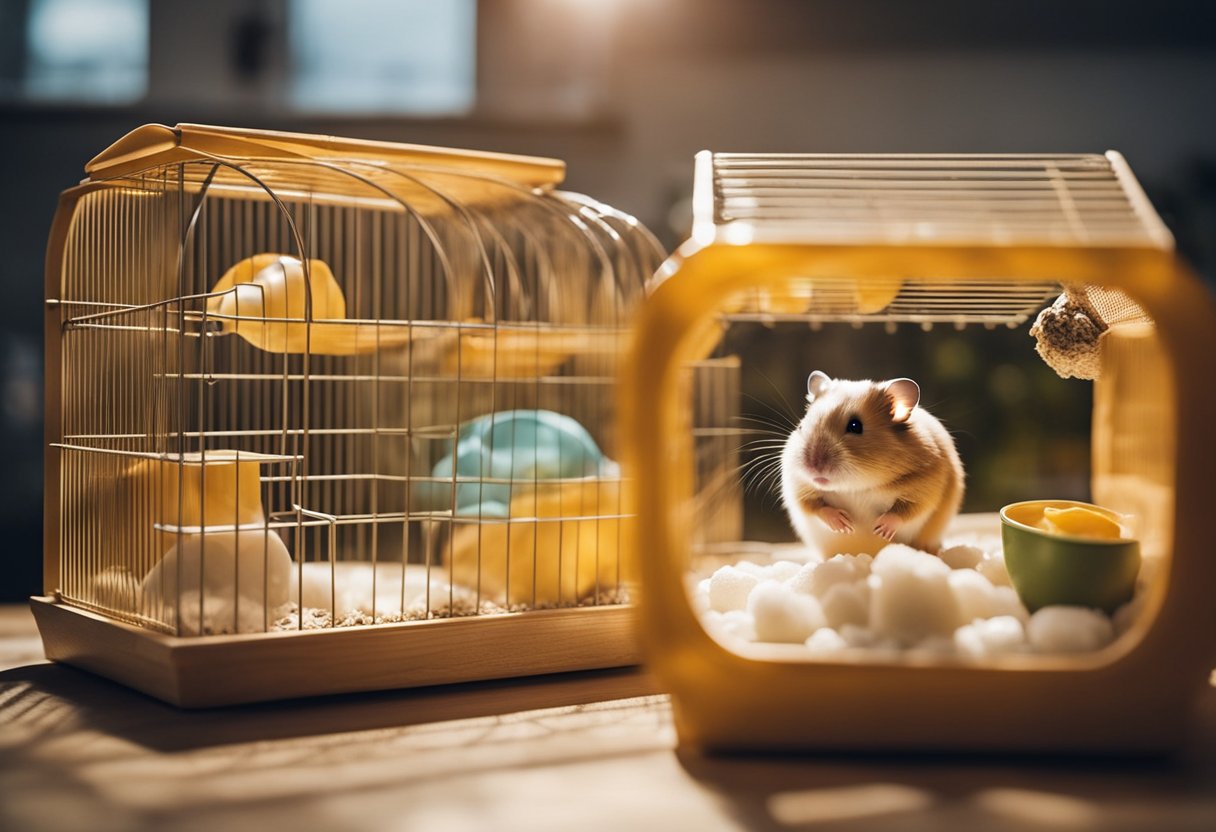
As a responsible hamster owner, it is your duty to ensure that your furry friend lives in a clean and hygienic environment. A dirty cage can make your hamster sick and lead to a host of health problems. Here are some best practices for maintaining a clean hamster habitat.
Cleaning Frequency and Techniques
Cleaning your hamster’s cage should be a regular part of your routine. A general rule of thumb is to clean the cage once a week, but this can vary depending on the size of the cage, the number of hamsters, and the type of bedding used. You should also spot-clean the cage daily, removing uneaten food, and soiled bedding.
When cleaning the cage, it is important to use the right techniques. Start by removing your hamster from the cage and placing it in a secure area. Then, remove all toys, food bowls, and water bottles. Next, remove the old bedding and wash the cage with mild soap and warm water or a cage cleaning solution. You may also opt to wash the cage with vinegar, but be certain to thoroughly rinse any residue away when done.
After cleaning the cage, dry it completely before adding fresh bedding. Finally, replace the toys, food bowls, and water bottles. Make sure to wash and dry them thoroughly before putting them back in the cage.
Choosing the Right Cleaning Supplies
When cleaning your hamster’s cage, it is important to use the right cleaning supplies. You should avoid using harsh chemicals or cleaning products that contain bleach, ammonia, or other strong chemicals. These can be harmful to your hamster and cause respiratory problems.
Instead, opt for mild soap and warm water or a cage cleaning solution. You may also use vinegar to clean the cage, but be sure to rinse it thoroughly to remove any residue.
In addition to cleaning supplies, you should also have the right tools on hand. These include a dustpan and brush, a vacuum cleaner, and paper towels. You may also want to invest in a small broom and dustpan set to make cleaning easier.
By following these best practices, you can ensure that your hamster lives in a clean and healthy environment. A clean cage will help prevent illness and keep your furry friend happy and comfortable.
Resources
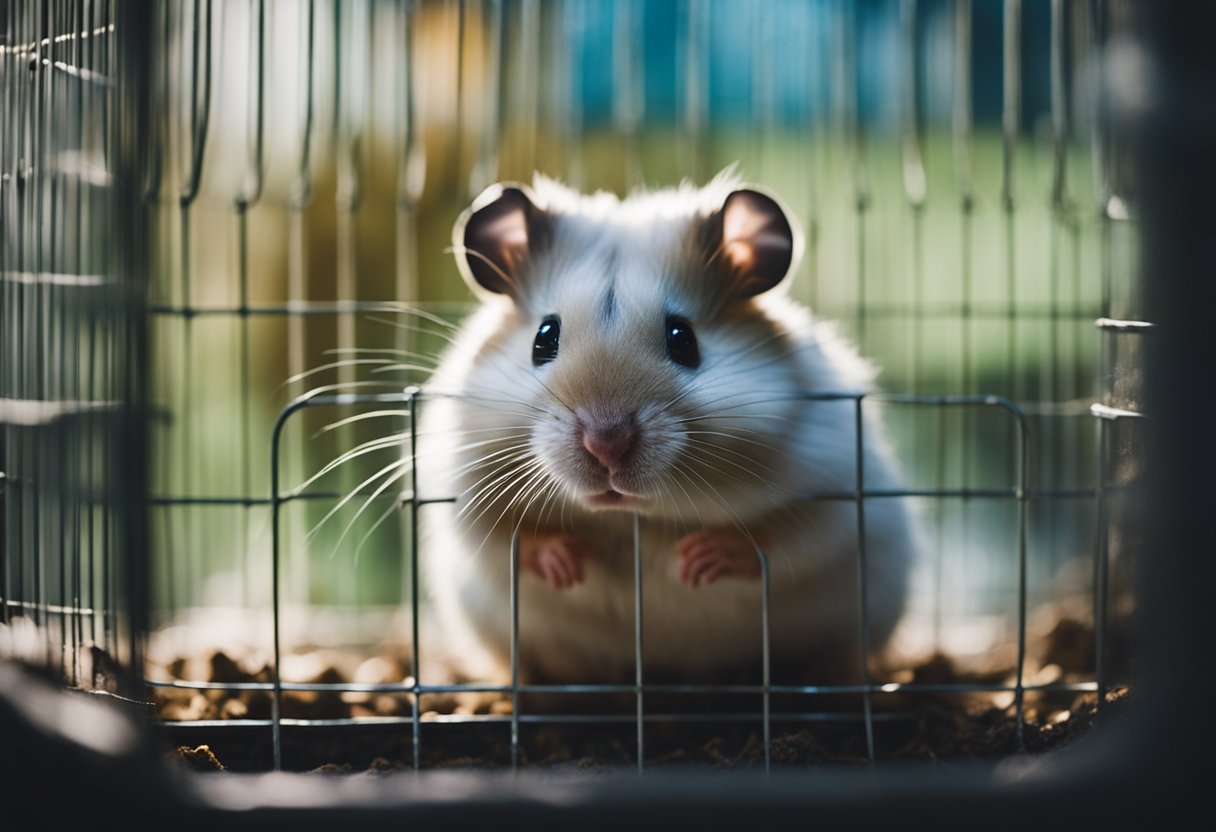
Keeping your hamster’s cage clean is essential for its health and well-being. A dirty cage can cause respiratory infections, skin irritations, stress, and even death. Fluffy Hamsters! recommends cleaning the cage at least once a week and spot cleaning daily. Signs of a dirty cage include bad odor, dirty bedding, and aggressive behavior.
According to Petshun, hamsters are prone to respiratory issues, and a dirty cage can harbor bacteria and fungi that can cause infections and respiratory problems. If left uncleaned, a dirty cage can also attract pests like mites or flies, which can transmit diseases to your hamster.
It is crucial to use safe cleaning products when cleaning your hamster’s cage. Avoid using harsh chemicals that can harm your pet. Fluffy Hamsters! suggests using safe cleaning products like vinegar and water or pet-safe disinfectants.
In addition to keeping the cage clean, it is essential to provide your hamster with a healthy diet, fresh water, and a comfortable living environment. PetHelpful warns that a dirty cage will cause Aspergillus to grow, and it also tends to grow in the bedding in the area where the hamster potties the most. Corn cob bedding is prone to developing Aspergillus, as it seems to grow faster here than in any other bedding. It will also grow on fruits and food that has been left in the cage for way too long.
By following these tips and resources, you can ensure that your hamster stays healthy and happy.
Conclusion
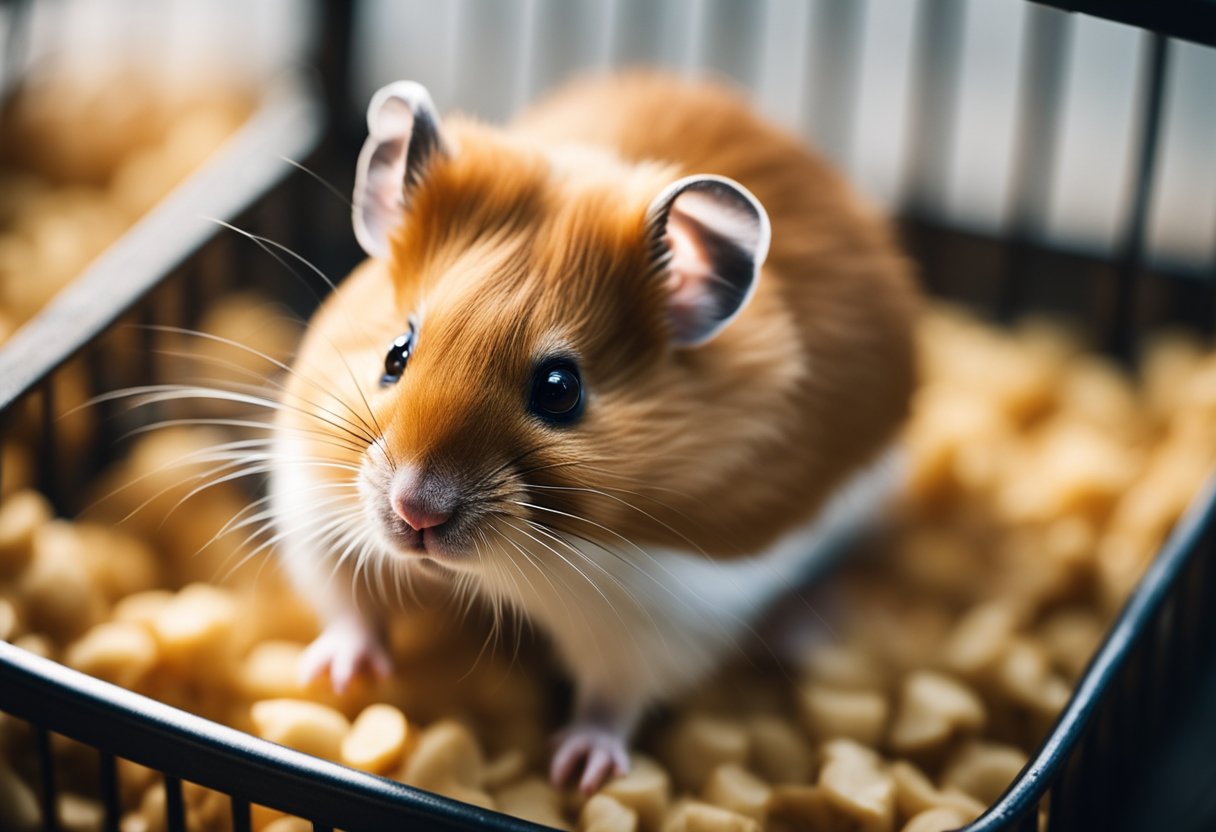
In conclusion, keeping your hamster’s cage clean is crucial to maintaining their health and well-being. A dirty cage can lead to respiratory infections, urinary tract infections, skin conditions, digestive disorders, and parasitic infestations. Regular cleaning and disinfecting of the cage, along with providing fresh bedding and water, can help prevent these issues.
It is important to note that some hamsters may prefer a slightly dirty cage, as they may feel more secure in a familiar environment. However, this does not mean that the cage should be left completely uncleaned. Spot cleaning should still be done daily, and a full cleaning should be done at least once a week.
When cleaning the cage, be sure to use safe cleaning products and avoid common mistakes like using harsh chemicals or not rinsing thoroughly. Additionally, pay attention to any changes in your hamster’s behavior or health, as this may indicate a need for more frequent cleaning or a visit to the vet.
Overall, keeping your hamster’s cage clean and hygienic is an important aspect of being a responsible and caring pet owner. By following these tips and guidelines, you can help ensure that your furry friend stays healthy and happy for years to come.
Frequently Asked Questions
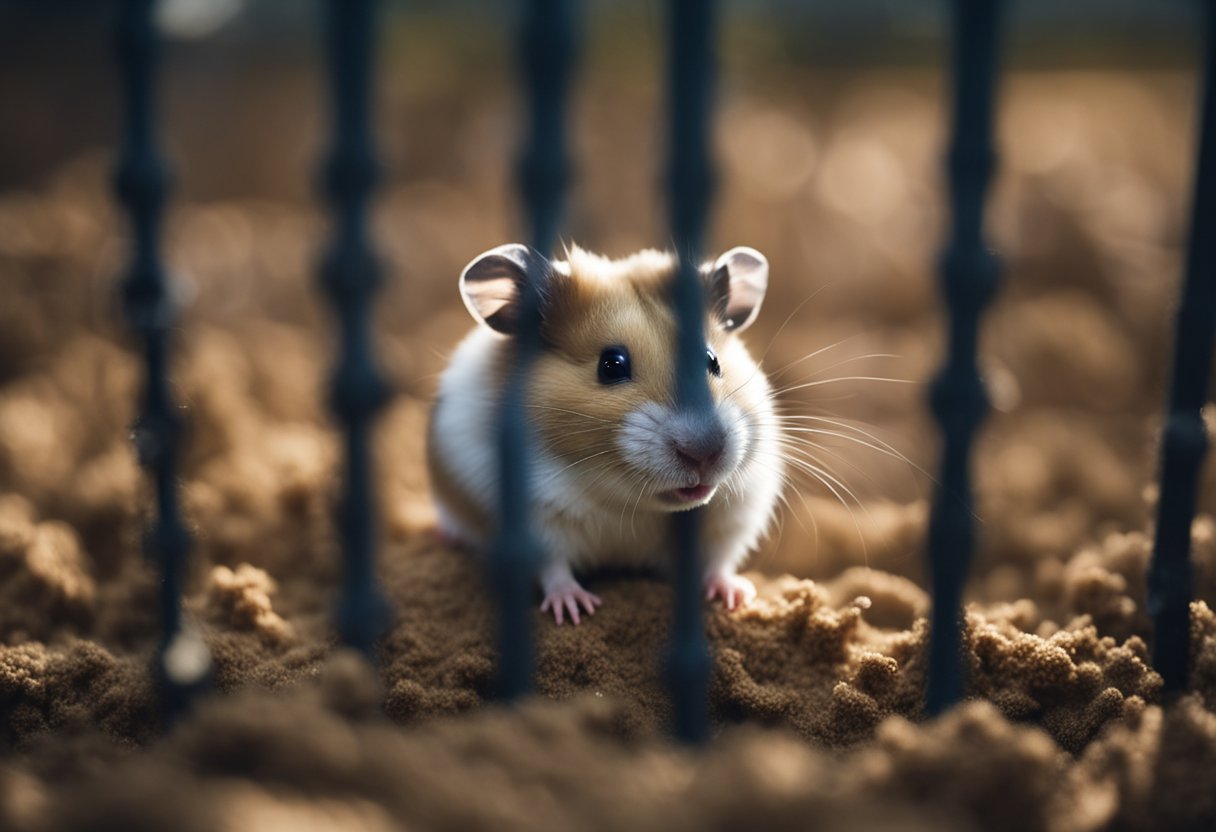
What are the common signs of illness in hamsters due to unclean habitats?
Hamsters living in dirty cages may exhibit signs of illness such as respiratory problems, skin irritations, stress, and even death. Signs of a dirty cage include bad odor, dirty bedding, and aggressive behavior. If you notice any of these signs, it is essential to clean your hamster’s cage immediately.
How frequently must a hamster’s habitat be cleaned to ensure its health?
To ensure your hamster’s health, it is recommended to clean the cage at least once a week and spot clean daily. However, if your hamster is particularly messy, you may need to clean the cage more frequently. Keeping a clean cage is crucial to prevent your hamster from contracting diseases.
What diseases can hamsters contract from an unsanitary cage?
Hamsters can contract various diseases from an unsanitary cage, including respiratory infections, skin infections, and wet tail disease. Wet tail disease is a severe and potentially fatal condition that is caused by a bacterial infection in the hamster’s digestive system. Keeping your hamster’s cage clean and dry can help prevent this disease.
How can poor cage hygiene impact a hamster’s behavior and well-being?
Poor cage hygiene can have a significant impact on a hamster’s behavior and well-being. A dirty cage can cause stress and anxiety, which can lead to aggressive behavior and a weakened immune system. A clean and comfortable environment is essential for your hamster’s mental and physical health.
What cleaning agents are safe to use in a hamster’s cage?
When cleaning your hamster’s cage, it is essential to use safe cleaning products and avoid common mistakes like using harsh chemicals or scented cleaning agents. You can use a mild soap and water or a vinegar and water solution to clean the cage. It is essential to rinse the cage thoroughly and let it dry completely before putting your hamster back in.
Can leftover bedding and food in a hamster cage lead to health issues?
Yes, leftover bedding and food in a hamster’s cage can attract pests like mites or flies, which can transmit diseases to your hamster. It is essential to remove any uneaten food and replace the bedding regularly to keep the cage clean and prevent your hamster from getting sick.
